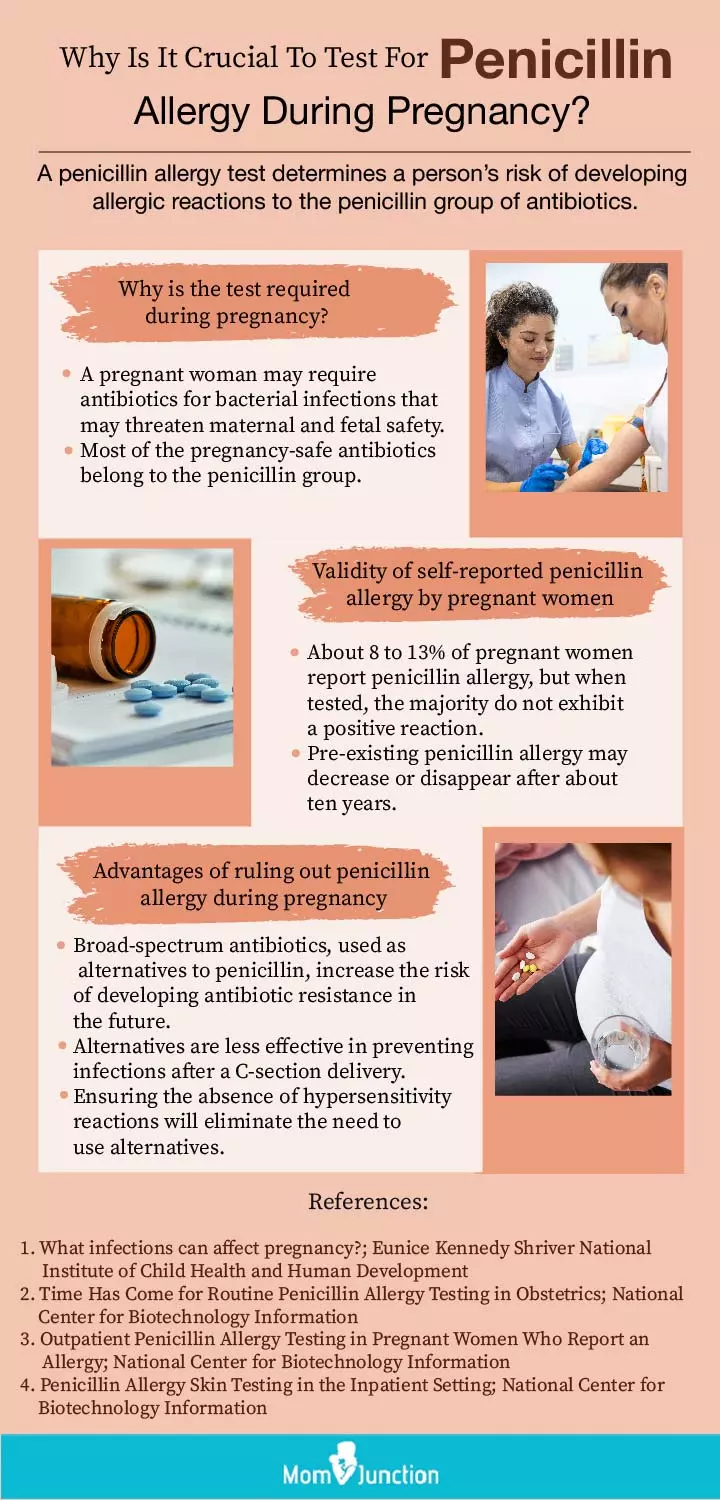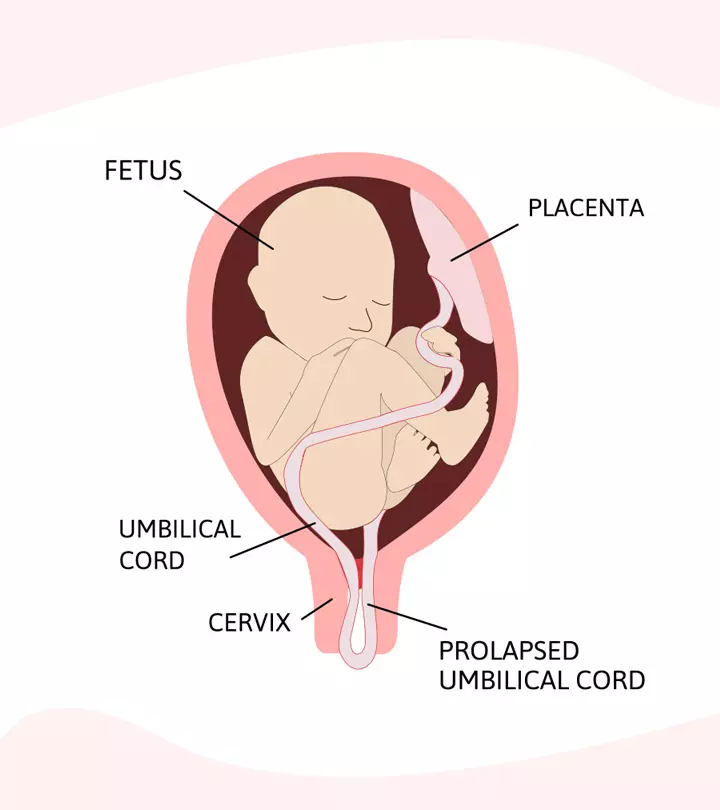
Image: Shutterstock
Amoxicillin while pregnant is mostly recommended during the second and third trimesters. This antibiotic helps prevent vaginal and cervical infections by preventing the multiplication of bacteria (1) (2). Amoxicillin is a penicillin antibiotic often prescribed in combination with clavulanate, which enhances the efficiency of amoxicillin.
You may be prescribed amoxicillin in any trimester of pregnancy. The antibiotic is generally considered safe for use during pregnancy. However, in rare cases, some women with certain risk factors may experience complications based on the pregnancy factors (3).
So, can you take amoxicillin while pregnant? Read this post to know the safe dosage and side effects of amoxicillin while pregnant.
Key Pointers
- Amoxicillin is considered safe during the first trimester of pregnancy and helps prevent urinary or respiratory infections.
- Enough data do not support its safety during the second and third trimesters, so consult a doctor before taking it.
- Some common side effects of amoxicillin are nausea, vomiting, and stomach cramps.
- Before taking amoxicillin, inform a doctor if you are allergic to penicillin or taking any other medication.
Is Amoxicillin Safe During Pregnancy?

Image: Shutterstock
The FDA has approved amoxicillin as a pregnancy category B medication. It means that the medicine is safe for treating infection in pregnancy (4). A few prospective studies revealed that first-trimester use of amoxicillin does not pose any threat to the health of the mother and the baby with negligible risks for fetal complications (5) (6).
Although amoxicillin is one of the most commonly prescribed antibiotics to pregnant women, there is not enough data to prove its safety during the second and third trimesters. Hence, it is crucial to take a doctor’s approval before taking the medication to minimize the risk of adverse effects on maternal health or fetal development.
 Be watchful
Be watchfulWhat Are The Side Effects Of Amoxicillin On Pregnancy?

Image: IStock
Amoxicillin is commonly prescribed as a prophylactic treatment for preventing or treating common infections related to pregnancy, such as urinary tract infections and respiratory tract infections (4). The side effects are generally not alarming. Common side effects of amoxicillin include (7):
- Nausea and vomiting
- Stomach upset or diarrhea
- Abdominal cramps
- Vaginal infection
 Quick tip
Quick tipWhat Are The Possible Complications Associated With Amoxicillin?

Image: IStock
Although rare, getting some insight into the possible complications associated with amoxicillin during pregnancy is important.
- Cleft lip or cleft palate: It is a common birth complication where a gap in the lip or a wider gap extending from the lip to the nose can be seen in the baby. A few studies show that prenatal exposure to amoxicillin during the first trimester can increase the risk for congenital disabilities by twofold (4).
- Necrotizing enterocolitis: The disorder of the intestines characterized by its inflammation and perforation, and it is mostly seen in preterm babies. A study found that women taking amoxicillin during the third trimester had slightly increased risks for their baby to be born with necrotizing enterocolitis (1)
Note:
There have been contradictory researches regarding the safety of amoxicillin during pregnancy. Hence doctor’s consultation is advisable.
What To Ask Your Doctor?

Image: Shutterstock
Do not take amoxicillin without a doctor’s prescription. Take the below precautions while taking amoxicillin by letting your doctor know (7):
- If you have any allergies, especially if you’re allergic to penicillin.
- If you are taking any other medicines since amoxicillin can react with certain medicines and cause adverse effects.
- In case of any side effects as it may indicate underlying morbidity.
- If the infections are not cured or if there is an infection recurrence even after taking amoxicillin.
- If there is any allergic reaction after taking the antibiotic.
Also, do not take the antibiotic more than the prescribed amount. It’s important to have an open and detailed discussion with your healthcare provider about using amoxicillin during pregnancy. Your doctor can help determine if the benefits outweigh any potential risks. Don’t hesitate to ask about other safe treatment options that may be available.
Frequently Asked Questions
1. Does taking amoxicillin and clavulanate increase the chance of miscarriage?
No, there is no medical evidence associating amoxicillin or amoxicillin in combination with clavulanate, with an increased risk for miscarriage. Miscarriage can happen anytime during pregnancy due to several reasons (3).
2. Can I breastfeed while taking amoxicillin?
Amoxicillin can enter breast milk. However, apart from some rare and minor birth allergies, your baby will not have any serious health problems from your breast milk (1).
3. Is amoxicillin safe during pregnancy for UTIs?
Yes, amoxicillin can safely treat a UTI during pregnancy. Other commonly used antibiotics include ampicillin, cephalosporins, nitrofurantoin, and trimethoprim-sulfamethoxazole (8).
4. Is it safe to take amoxicillin 500mg during pregnancy?
Yes, it is safe to take 500mg of amoxicillin during pregnancy. According to the old FDA classification system, amoxicillin is a pregnancy category B drug, which indicates that no studies have been performed that demonstrated a clear risk during pregnancy. The available scientific literature considers it to be a pregnancy-compatible drug. The therapeutic dose in pregnant women is the same as that for their non-pregnant counterparts and is 750-1750 mg per day in divided doses every 8-12 hours. However, consult your doctor for precise dosage as per your pregnancy stage and health conditions (9).
Taking amoxicillin while pregnant is considered safe and has also been approved by the FDA. However, there might be some observed side effects of the medication, such as nausea, vaginal infection, or abdominal cramps. Therefore, it should be noted that one should only take amoxicillin in the amount prescribed by your healthcare provider to avoid any complications, the occurrence of which are even though rare. Make sure you take proper care of yourself during your pregnancy and report any signs of concern or doubt to your doctor to avoid any risks.
Infographic: Testing For Penicillin Allergy During Pregnancy
The majority of the pregnancy-safe antibiotics belong to the penicillin group. The infographic below tells you why it is important to screen for penicillin allergy during pregnancy, even if the pregnant woman reports a history of intolerance or allergic reactions. Illustration: Momjunction Design Team
Illustration: Is It Safe To Take Amoxicillin When Pregnant? Risks To Know

Image: Stable Diffusion/MomJunction Design Team
References
- Amoxicillin and clavulanate.
https://mothertobaby.org/fact-sheets/amoxicillin-clavulanate/ - Thinkhamrop J et al. (2015), Antibiotic prophylaxis during the second and third trimester in pregnancy to reduce adverse pregnancy outcomes and morbidity.
https://www.cochrane.org/CD002250/PREG_antibiotic-prophylaxis-during-the-second-and-third-trimester-in-pregnancy-to-reduce-adverse-pregnancy-outcomes-and-morbidity - Use of penicillin antibiotics.
https://www.medicinesinpregnancy.org/medicine–pregnancy/amoxicillin/ - Kueiyu Joshua Lin et al. (2012), Maternal Exposure to Amoxicillin and the Risk of Oral Clefts.
https://www.ncbi.nlm.nih.gov/pmc/articles/PMC3729019/ - Matitiahu Berkovitch et al. (2004) First-trimester exposure to amoxycillin/clavulanic acid: a prospective, controlled study.
https://www.ncbi.nlm.nih.gov/pmc/articles/PMC1884575/#idm139816258586512title - Sharon Daniel et al. (2019), The safety of amoxicillin and clavulanic acid use during the first trimester of pregnancy.
https://www.ncbi.nlm.nih.gov/pmc/articles/PMC6955403/ - Amoxicillin.
https://www.urmc.rochester.edu/medialibraries/urmcmedia/medicine/general-medicine/patientcare/documents/amoxicillin_brochure_urmc.pdf - Patricia J. Habak and Robert P. Griggs, Jr.; (2021); Urinary Tract Infection In Pregnancy.
https://www.ncbi.nlm.nih.gov/books/NBK537047/ - Bobak J. Akhava et al.; (2022); Amoxicillin.
https://www.ncbi.nlm.nih.gov/books/NBK482250/
Community Experiences
Join the conversation and become a part of our nurturing community! Share your stories, experiences, and insights to connect with fellow parents.
Read full bio of Dr. Annal Vaidya
Read full bio of Aneesha Amonz
Read full bio of Rebecca Malachi
Read full bio of Reshmi Das

















